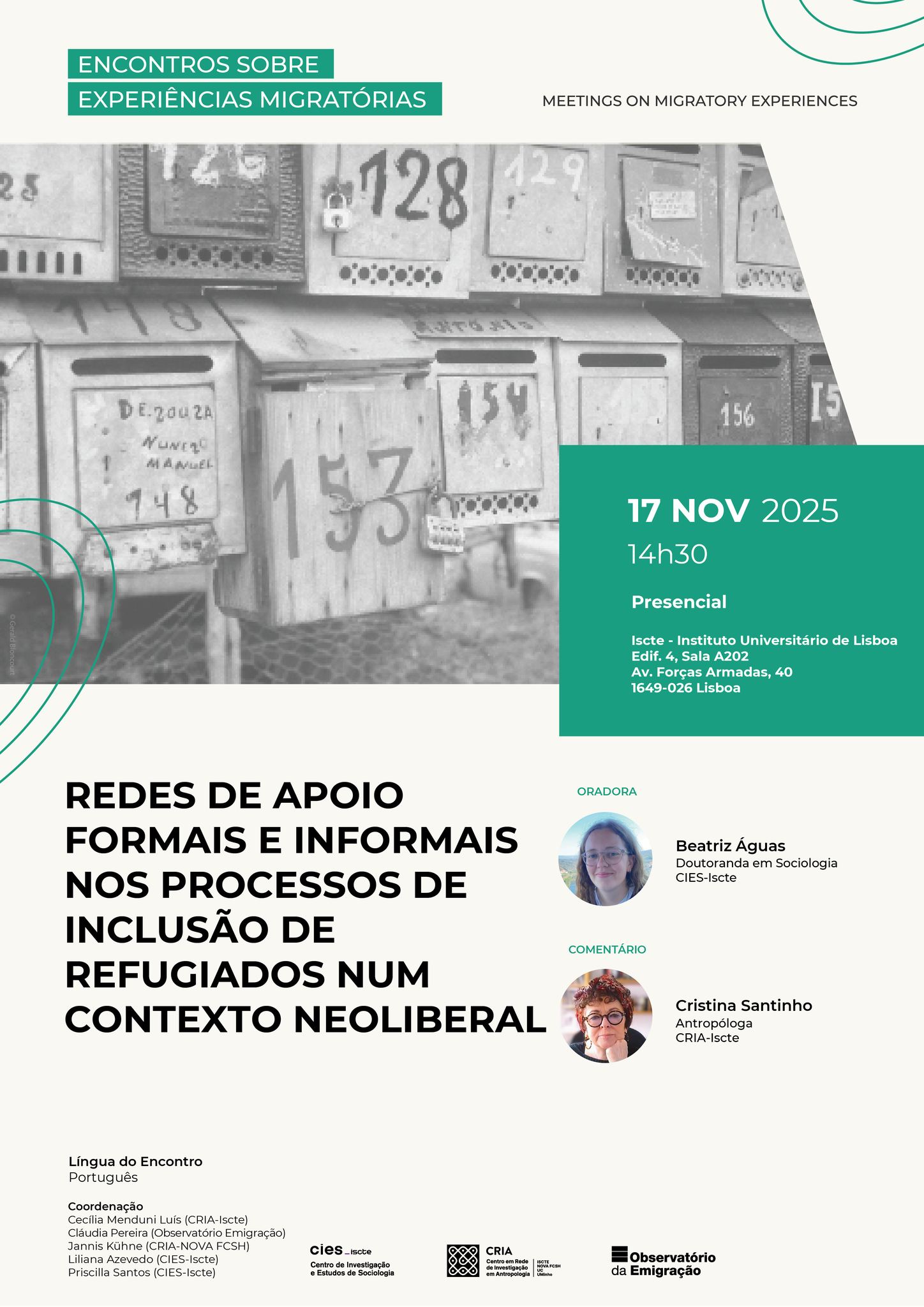- News
- Events
- Recurring Events
- Biographies and Trajectories
- Cidades & Impérios: dinâmicas locais, fluxos globais
- Cultural Diversity in Contemporary Families
- Meetings on China Studies
- Meetings Migration Experiences
- Social studies on science and the circulation of knowledge
- Public Policy Forum
- Research Forum CIES
- Gender, Sexuality and other social markers of difference
- ETNO.URB Readings
- Social Movements and Political Action
- New Perspectives on Modern History
- Revisiting the 19th Century
- Research Workshops
- Methodological Innovation Workshops
- Calls
The next Meeting on Migratory Experiences, with the theme “Formal and Informal Support Networks in the Processes of Refugee Inclusion in a Neoliberal Context,” will be held on November 17, 2025, in room A202 of Building 4 at Iscte.
SPEAKER
Beatriz Águas
PhD student in Sociology, CIES-Iscte
COMMENTARY
Cristina Santinho
Anthropologist, CRIA

ABSTRACT
A sociology research project will be presented that analyzes the role of formal and informal support networks in the processes of welcoming and including refugees in Portugal and Spain, based on research already begun in the master's program. It proposes to analyze how, in a context where the welfare state adopts a neoliberal model, there is an intentional transfer of responsibilities to the third sector and civil society with regard to the reception and inclusion of refugees, in areas such as access to housing, health, education/training, the (formal) labor market, services, and belonging. Through a qualitative methodology - with analysis of secondary data from participant observation carried out for the master's thesis, interviews with refugees with recognized status and members of formal and informal support networks, taking into account their heterogeneity – the aim is to understand how these formal and informal support networks operate, what their impact is on inclusion processes, and what inequalities result from their presence or absence. The project proposes a critical reflection on the externalization of social protection and the consequences of inclusion based on informal and unequal social capital.
BIOGRAPHICAL NOTES
Beatriz Águas is a PhD student in Sociology at Iscte - Instituto Universitário de Lisboa, where she completed her bachelor's and master's degrees in the same field, with a dissertation entitled “The (In)capacity of the Welfare State in the Socioeconomic Inclusion of Asylum Seekers and Refugees in Portugal.” Her main research interests include the Welfare State and Public Policy, Work and Social Welfare, Social Inequalities, and Migration, Mobility, and Ethnicity. She has completed internships at the Portuguese Refugee Council (2024) and CIES-Iscte (2025), and has participated in national (APS Congress 2025) and international scientific events (IMISCOE Workshop “Language Diversity, Education, and Learning in the Context of Migration and Diaspora” in Lisbon, November 2025).
Cristina Santinho is an anthropologist with a PhD in Anthropology from ISCTE-IUL. Her main research topics are refuge and asylum in Portugal, immigration, mobility, and human rights. She is a senior researcher at CRIA (Center for Research in Anthropology). She was a professor at Universidade Lusófona and a visiting professor at Iste - Instituto Universitário de Lisboa. She has coordinated and participated in several academic projects related to her research topics. She has supervised numerous doctoral and master's theses on the subject of refuge and has also published several scientific articles on the topic. She is part of the “Refuge Forum,” made up of various refugee associations, and is co-coordinator of the “Academias na Mesa” group, in partnership with other researchers from various universities.



